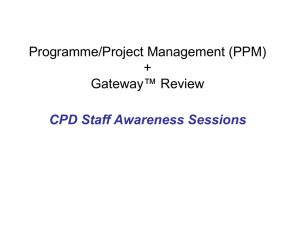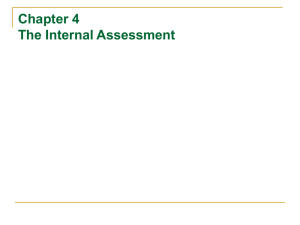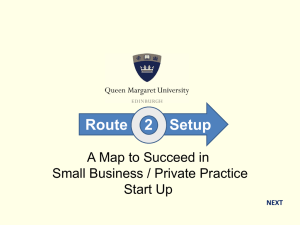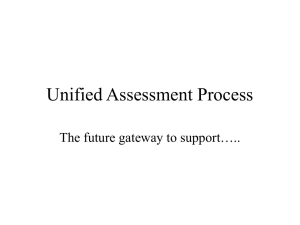Small Business Start Up Route Map
advertisement
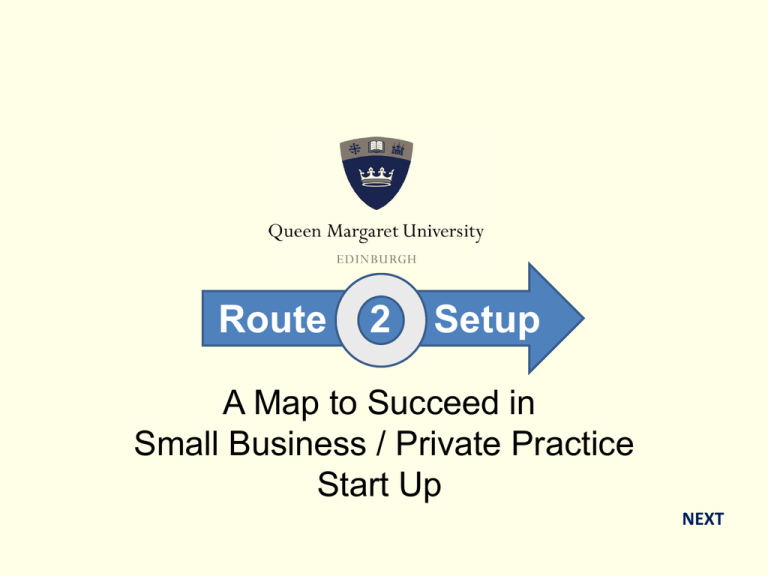
Route 2 Setup A Map to Succeed in Small Business / Private Practice Start Up NEXT How to use the map The following map has been designed to lead you through the processes and challenges of starting up your own small business / private practice. Although not exhaustive, this route map will allow you to guide yourself through the most common challenges of business start up. The map is easy to navigate. The main line ----- takes you through the eight main stations to starting your own business. The lines coming off these main stations give you more specific information about individual topics. Click on the station, or topic, you wish to find out about. Once you have read the information just click on the logo at the bottom of every page and it will return you to the main map. BACK NEXT Good Luck Learn from Experience of Others Legal & Financial Advice Mentor Entrepreneurship Who Needs to Know? Grow your business References & Acknowledgements Useful Contacts Networking Pros & Cons Naming your Practice MAKING A START Practice Arrangements BUSINESS PLAN BUSINESS STRUCTURE Trading Arrangements What is Marketing? FINAL DESTINATION Why you need Marketing The 7 Ps of Marketing MARKETING PREMISES & EQUIPMENT Raising Finance SCOPE OF PROFESSIONAL PRACTICE FINANCE Managing Finance Practice Accreditation Clinical Standards Financial Forecasts Insurance CPD BACK START UP ROUTE MAP Regulatory & Professional Bodies MAKING A START The Making A Start line identifies elements to consider when you are thinking of setting up in private practice. • Pros & Cons • Entrepreneurship • Learn from experiences of others Click on the above categories to start your journey on this line. The QMU logo will take you back to the Making A Start station and map. BUSINESS STRUCTURE The Business Structure line looks at elements involved in forming and naming your business. • Trading arrangements • Practice arrangements • Naming your practice • Who needs to know? • Legal & Financial advice Click on the above categories to start your journey on this line. The QMU logo will take you back to the Business Structure station and map. MARKETING The Marketing line introduces you to marketing and its importance to business. • What is marketing? • Why you need marketing • The 7 Ps of marketing Click on the above categories to start your journey on this line. The QMU logo will take you back to the Marketing station and map. PREMISES & EQUIPMENT The Premises & Equipment line takes you through the main aspects involved in choosing work premises and equipment. • Which premises? • Viewing premises • Buy or lease? • Working from home • Planning permission & Building regulations • Disability access & considerations • Health & Safety / Environment issues • Equipment needs • Practice accreditation Click on the above categories to start your journey on this line. The QMU logo will take you back to the Premises & Equipment station and map. SCOPE OF PROFESSIONAL PRACTICE The Scope Of Professional Practice line summarises professional points to consider within private practice & provides links to various professional organisations. • Practice accreditation • Clinical standards • CPD • Regulatory & Professional bodies Click on the above categories to start your journey on this line. The QMU logo will take you back to the Scope Of Professional Practice station and map. SCOPE OF PROFESSIONAL PRACTICE The Scope Of Professional Practice line summarises professional points to consider within private practice & provides links to various professional organisations. • Practice accreditation • Clinical standards • CPD • Regulatory & Professional bodies Click on the above categories to start your journey on this line. The QMU logo will take you back to the Scope Of Professional Practice station and map. FINANCE The Finance line provides a summary of financial considerations when setting up in private practice. • Raising finance • Managing finance • Financial forecasts • Insurance Click on the above categories to start your journey on this line. The QMU logo will take you back to the Finance station and map. BUSINESS PLAN The BUSINESS PLAN line provides a summary & guide to creating your business plan. • What is a business plan? • Executive summary • Vision for business • Sales & Marketing • Running your business • Finances Click on the above categories to start your journey on this line. The QMU logo will take you back to the BUSINESS PLAN station and map. FINAL DESTINATION The Final Destination line provides some final considerations before you start your business. • Mentor • Networking • Grow your business • Useful contacts • References & Acknowledgements • Good luck Click on the above categories to start your journey on this line. The QMU logo will take you back to the Final Destination station and map. PROS AND CONS Is private practice right for you? Elements you may wish to consider Pros • Personal challenge & opportunity • Independence & autonomy • Flexible working hours & flexible work location • Direct ‘effort & financial reward’ relationship Cons • Business & financial insecurity • Self finance of pension & work benefits • On going business administration • Impact on work/life balance (Physio123, 2012) Useful Links: • Business Gateway: Why work for yourself? • Physio123: Benefits of private practice ENTREPRENEURSHIP Am I an entrepreneur? Yes, when you undertake and manage the risk of setting up a business, you are an entrepreneur. Qualities of an entrepreneur Most successful entrepreneurs share certain common qualities which Business Gateway (2012) identifies as: • • • • Self confidence and Self determination Commitment and Perseverance Initiative and Judgement Self starter Discover how these qualities and personal skills can help you start up in business: • Business Gateway: Match your business skills and experience LEARN FROM EXPERIENCE OF OTHERS Learn from both the mistakes and the successes Speaking to those already in private practice, or to someone who has had experience of setting up a small business, will give you an insight into the realities of starting up a practice. Suggested sources of local contacts: • Professional Bodies • Private Practitioner Groups (if available) • QMU Alumni & Friends • QMU Careers (2 year post-grad access) Business Gateway provide a series of video diaries Start up diaries in which others share their experiences of setting up in business. Business Gateway also provide access to a network of experienced business advisors who you can contact through Ask the Advisor and ask direct questions. TRADING ARRANGEMENTS How you will trade - your first important decision The structure of your business affects the tax you pay. It is therefore extremely important to select the most appropriate legal structure. Structures relevant to private practice • • • Sole trader Partnership Private limited company (Business Gateway 2012) To consider these options further: • Business Gateway: Legal structures: the basics TRADING ARRANGEMENTS How you will trade - your first important decision The structure of your business affects the tax you pay. It is therefore extremely important to select the most appropriate legal structure. Structures relevant to private practice • • • Sole trader Partnership Private limited company (Business Gateway 2012) To consider these options further: • Business Gateway: Legal structures: the basics PRACTICE ARRANGEMENTS Other considerations for the structure of your business • • • • Start up as a new practice from scratch? Buy an existing practice? Join an established practice? Work full or part time? (Santander 2012) These decisions will have a direct impact on your set up costs & the income you can expect to receive. For a guide to buying an existing business: • Business Gateway: Buy an existing business NAMING YOUR PRACTICE What’s in a name? • Naming your practice needs careful consideration. • The name will define your business, so ensure it is relevant to clients and it conveys the service you wish to provide. • The practice name is significant for future branding & marketing. (Hill et al 2008) For guidance on naming your practice: • Business Gateway: Choose the right name for your business WHO NEEDS TO KNOW? When you make the decision to set up in private practice there are certain people and agencies who need to be informed: • Her Majesties Revenue & Customs (HMRC) You must register your business with HMRC for business tax. This is further explained in ‘Tax, NI & VAT’ under the FINANACE line. HMRC provides a comprehensive guide in ‘Starting a business’. You must tell HMRC within 3 months of starting otherwise you may face a fine. (HMRC 2012) • Companies House You must inform Companies House if you have decided to set up a company. • Professional Body Your professional body may require this information to update your registration. • Employer If you will still be working for someone else when you set up then you may be legally required to inform your employer – check your contract of employment. (Hill et al 2008) LEGAL & FINANCIAL ADVICE Getting professional advice Getting the right legal & financial advice is an essential element in setting up a new business. Advice is required for many aspects of business, including: • • • Bookkeeping Lease negotiations Written agreements For general advice on what to consider when choosing financial & legal advisers and links to professional bodies: • GOV.UK: Set up your business – (see section ‘Working with advisers’) WHAT IS MARKETING? Marketing is more than advertising The Chartered Institute of Marketing define marketing as: ‘’the management process responsible for identifying, anticipating and satisfying customer requirements profitably’’ (CIM, 2012) The goals of marketing are achieved by developing: • A marketing strategy – how to promote the benefit of your services and meet the needs of your clients • A marketing plan how you put your strategy into action (Business Gateway, 2012) WHY YOU NEED MARKETING Always remember your practice is a business Marketing will play a key role in the success of your business. Developing a marketing strategy enables you to: • • • • identify potential clients understand & meet client needs communicate the benefit of your services identify and address business strengths & weaknesses (Business Gateway 2012) THE 7Ps OF MARKETING Successful marketing addresses 7 key points: • • • • • • • Product Place Price Promotion People Process Physical Environment : your service : location where you provide your service : cost – price - profit : advertising : you/employees/clients : standards of practice : workplace standards (CIM, 2009) The following links provide an overview of marketing, how it works and its importance to your business: • Business Gateway: Marketing • NESTA: Worksheet 4a:Marketing mix WHICH PREMISES? This is a key decision and there are many elements to consider when looking for premises. Choosing the wrong premises can be a costly mistake. • What area? this will have an impact on the type of practice you develop • Space? space costs – what do you really need? • Buy or Lease? what are the financial implications? (Hill et al 2008) VIEWING PREMISES There are many things to consider when viewing potential premises: Location: • are the premises near your client base? • are the premises near other healthcare providers, eg GP practice, to help build local business networks / referral networks Affordability: • can you afford rent/mortgage, business rates & utilities? • remember professional fees & insurance • will there be costs to decorate, maintain & repair premises? • will there be costs to meet the various regulatory standards? Amenities & facilities: • is there space for car parking for your clients? Branding & future development: • is there scope for future expansion • do the premises reflect the image of your business? (Hill et al 2008) BUY OR LEASE? Buy This option allows you more control over the use and development of the premises however it requires available capital. Business Gateway look at the advantage & disadvantages of this choice in: Buying business premises. Lease The majority of small businesses will choose to rent their premises as it is often the most financially viable option. Main considerations: • is the rent reviewed; is it all inclusive or are there hidden charges? • how long do you want to commit to the lease? • can you leave your lease early / can you renew your lease? Business gateway consider this option further in: Renting business premises. (Business Gateway, 2012) Ask the professionals: • Choosing the wrong property can be costly. • Consult property experts: chartered surveyor / solicitor / bank manager Useful link: Business Gateway: Choose the right premises for your business WORKING FROM HOME If your home could accommodate your business requirements, then working from home may be an option. Advantages: • lower costs (no rental fees or commuting costs) • flexible working hours Disadvantages: • difficulty in keeping a good work-life balance • isolation (Business Gateway, 2012) There are many factors to consider when setting up a home based business. The following helpful Business Gateway link takes you through the checks to do before you decide to work from home: • Starting a business from home PLANNING PERMISSION & BUILDING REGULATIONS Alteration - Renovation - Decoration If you want to make any changes to the premises, then you must follow relevant planning rules and building regulations. You may need to apply for planning permission and/or comply with building regulations if you are considering: • any building work • alterations of property • a change of usage. As rules and regulations vary across regions, contact your Local Authority for guidance. (Hill et al, 2008) For further information: • Business Gateway: Local authority services – ‘Planning and building regulations’ DISABILITY ACCESS & CONSIDERATIONS Are the premises and facilities accessible? Under the Equality Act (2010), any business that provides a service to the public is legally required to make ‘reasonable adjustments’ to the ‘physical features of your premises to better enable disabled people access to your services’. (Government Equalities Office, 2010) This can include ‘reasonable adjustments’ to: • entrances and exits • parking areas • toilets. The Government Equalities Office has produced a series of guides, including a guide for business, to help explain what your new responsibilities are: Equality Act 2010: What do I need to know? Refer to your professional body for additional guidance HEALTH & SAFETY ENVIRONMENT ISSUES All businesses are responsible for providing a safe and healthy working environment. To help reduce risk at work there are health and safety laws which protect those affected by your business’ activities (you, staff, clients, suppliers). Duties include: • carrying out a risk assessment • writing your business’ health and safety policy • first aid and accident guidelines. (Hill et al, 2008) You also have legal responsibility for the environmental impact of your business. Your duties of care may include: • waste management • storage and use of hazardous substances • air and noise pollution. (Business Gateway, 2012) Refer to your professional body for specific guidelines Useful links: • Health and Safety Executive (HSE): Health and safety made simple – The basics for your business • NetRegs (organisation in partnership between UK environmental regulators): Guidance by business sectors EQUIPMENT NEEDS Equipment needs vary depending on your profession and scope of practice. Although purchasing the full range of equipment is tempting, it is also very expensive. It is therefore important to ask yourself: • • • do I really need this piece of equipment? how often will I use it? will it improve the level of service I can offer clients and thereby allow me to increase the level of fees commanded? Once you have decided that the equipment is required, next ask: • is it more financially beneficial to buy or to lease? (Hill et al, 2008) Refer to your Professional Body for guidelines on equipment requirements PRACTICE ACCREDITATION Each profession has a different range of systems, processes and procedures that allow practitioners to deliver an effective service. These set professional standards and guidelines underpin practice accreditation schemes which define the standards required for practice. If applicable, joining such a scheme allows you to: • • • demonstrate to clients your practice has achieved the appropriate standards demonstrate to authorities that you comply with relevant legislation use the guidelines to inform your decision on the suitability of potential premises (Hill et al, 2008) Contact your Professional Body for information on practice accreditation schemes PRACTICE ACCREDITATION Each profession has a different range of systems, processes and procedures that allow practitioners to deliver an effective service. These set professional standards and guidelines underpin practice accreditation schemes which define the standards required for practice. If applicable, joining such a scheme allows you to: • • • demonstrate to clients your practice has achieved the appropriate standards demonstrate to authorities that you comply with relevant legislation use the guidelines to inform your decision on the suitability of potential premises (Hill et al, 2008) Contact your Professional Body for information on practice accreditation schemes CLINICAL STANDARDS Each profession has their own set of clinical standards and guidelines. They are set out by each Professional/Association Body. Clinical standards and guidelines form the basis of practice accreditation schemes. (Hill et al, 2008) It is important to familiarise yourself with them as they will influence: • • • • the type of premises you choose the equipment you will need the health and safety guidelines you need to follow the environmental guidelines you need to follow. For Clinical Standards and Guidelines contact your Professional Body CPD Continuing Professional Development ‘CPD is the way professionals continue to learn and develop throughout their careers so they keep their skills and knowledge up to date and are able to work safely, legally and effectively.’ (HPC, 2012) CPD is a requirement of all health and social care professionals. It is important that you plan and allocate sufficient time and money to support this learning within your private practice. You must keep a CPD portfolio to record all learning. As a private practitioner, CPD that up-dates (not expands) your current skills and professional knowledge is a cost that can be offset against tax. (Hill et al, 2008) For guides to standards of CPD requirements contact your Professional and Regulatory Body REGULATORY & PROFESSIONAL BODIES Regulatory Bodies are independent of professional bodies. They act in the interest of the public and promote regulation. Regulatory bodies keep a register of health professionals who meet their standards for training, skills and behaviour. Professional/Association Bodies are independent of regulatory bodies. They act in the interest of the profession and support the practitioner. Members are required to meet its own standards for training, skills and behaviour. (GRCCT, 2012) Click on the following professions for details of their associated regulatory & professional bodies: • Dietetics • Nutrition • Occupational Therapy • Podiatry • Physiotherapy • Nursing • Speech & Language Therapy • Audiology • Hearing Aid Dispensers • Radiography • Art Psychotherapy • Music Therapy • Dance Movement Psychotherapy DIETETICS Regulatory Body: • Health and Care Professions Council (HCPC) Professional Body: • The British Dietetic Association (BDA) Suggestions of Private Practice Groups / Forums: • Freelance Dietitians • Dietetics.co.uk NUTRITION Regulatory Body: • Nutritionists are not regulated by a governing body in the UK Professional Body: • Association for Nutrition (AfN) Suggestions of Private Practice Groups / Forums: • The Nutrition Society (NS) • The Nutrition Society – Scottish Section • The Nutrition Society – Irish Section OCCUPATIONAL THERAPY Regulatory Body: • Health and Care Professions Council (HCPC) Professional Body: • British Association of Occupational Therapists (BAOT) Private Practice Groups / Forums: • The College of Occupational Therapists Specialist Section – Independent Practice PODIATRY Regulatory Body: • Health and Care Professions Council (HCPC) Professional Body: • The Society of Chiropodists & Podiatrists (SCP) Suggestions of Private Practice Groups / Forums: • SCP ‘Private Practice Forum’ members access only • Podiatry Arena PHYSIOTHERAPY Regulatory Body: • Health and Care Professions Council (HCPC) Professional Body: • Chartered Society of Physiotherapy (CSP) Suggested Private Practice Groups / Forums: • PhysioFirst NURSING Regulatory Body: • The Nursing and Midwifery Council (NMC) Professional Body: • Royal College of Nursing (RCN) SPEECH & LANGUAGE THERAPY Regulatory Body: • Health and Care Professions Council (HCPC) Professional Body: • Royal College of Speech & Language Therapists (RCSLT) Suggested Private Practice Groups / Forums: • Association of Speech & Language Therapists in Independent Practice (ASLTIP) AUDIOLOGY Regulatory Body: • The Registration Council for Clinical Physiologists (RCCP) Professional Body: • British Academy of Audiology (BAA) Suggested Private Practice Groups / Forums: • Association of Independent Hearing Healthcare Professionals (AIHHP) HEARING AID DISPENSERS Regulatory Body: • Health and Care Professions Council (HCPC) Professional Body: • British Society of Hearing Aid Audiologists (BSHAA) Suggested Private Practice Groups / Forums: • Association of Independent Hearing Healthcare Professionals (AIHHP) RADIOGRAPHY Regulatory Body: • Health and Care Professions Council (HCPC) Professional Body: • Society of Radiographers (SOR) Suggested Private Practice Groups / Forums: • SOR ‘Professional Standards for Independent Practitioners’ – members access only ART PSYCHOTHERAPY Regulatory Body: • Health and Care Professions Council (HCPC) Professional Body: • British Association of Art Therapists (BAAT) MUSIC THERAPY Regulatory Body: • Health and Care Professions Council (HCPC) Professional Body: • British Association for Music Therapy (BAMT) DANCE MOVEMENT PSYCHOTHERAPY Regulatory Body: • DMP is not a regulated profession. However application has been made to the Health and Care Professions Council (HCPC) for registration (click here to see application) • Standards of Proficiency – refer to HCPC standards for Art Therapists (click here to see document) Professional Body: • Association for Dance Movement Psychotherapy UK MANAGING FINANCE It is essential for any business to carefully manage their financial performance. The following list provides a linked overview of the elements involved: • Business banking • Bookkeeping • Tax, National Insurance & VAT • Consider your fees • Business budgeting • Should I use an accountant? BUSINESS BANKING The right bank and the right bank account will help in the success of your business Each business has its own needs, so it is important to take the time to research which bank will best meet your business needs. Business Gateway (2012) advise to carefully compare the different services and costs offered, including: • • • • • • facilities - eg debit and credit cards or telephone or internet banking interest rates - particularly if you're usually in credit overdraft charges - particularly if you're often overdrawn monthly fees additional account charges - eg for statements, cheques and cash payments additional services - eg small-business advice If you set up as a sole trader it may be possible to use your own personal bank account. If your bank allows this then it important to keep separate and detailed records of both personal and business transactions. (Hill et al, 2008) finance.scotland.gov.uk provide further information: • Understand the basics of business banking •‘ How to choose and manage a business bank account BOOKKEEPING Record the movement of your money • You must keep an accurate record of your income and outgoings. • You will need this information to help you complete your tax return correctly. • Records can be kept either on paper (eg. ledger book) or on computer. • Records must generally be kept for at least 6 years. HM Revenue & Customs (HMRC) may check to make sure you're paying the right tax at the right time and they can look at any record of the last 5 years. (HMRC, 2012) Important information and guidance on keeping records can be found at: • HMRC: Record keeping (self-employed) • finance.scotland.gov.uk: Accounts management TAX, NI & VAT When you start a business you become responsible for ensuring that the appropriate tax is paid. You must register with HM Revenue & Customs (HMRC) who will set up Tax and National Insurance records (appropriate to your working status) and supply a Self Assessment tax return to complete each year. The types of tax are: • • • • Income Tax* a tax on ‘taxable income’ Corporation Tax a tax on ‘taxable income’ of companies & organisations National Insurance* contributions which directly affect your entitlement to certain state benefits (including State Pension). Payable with income tax under Self Assessment. Value Added Tax payable if your turnover is more than the VAT threshold. *If you have employees you will need to arrange their tax & NI contributions . (HMRC, 2012) • • HMRC provide invaluable information on what you will need to consider when starting a business in: Starting a business Business Gateway also provides guides on Tax returns & Tax rates and allowances CONSIDER YOUR FEES When you decide on the prices to charge for your services, remember what is required to provide that service and the costs you need to cover: • • • • • your clinical knowledge and skills your time variable costs (eg strappings, dressings etc) fixed costs (eg rent & rates, CPD, marketing, administration etc) Pension/Tax/NI payments Market influences can also determine your fees (eg what other practices charge and what patients are willing to pay). (Hill et al, 2008) Your professional body may also be able to advise on current fee scales. In addition to setting fees, consider what forms of payment you will accept and discuss the options with your bank. BUSINESS BUDGETING Control your cash-flow A business budget allows you to carefully control and manage your finances. It is a plan of the financial outcomes you want your business to achieve. Business Gateway advise to keep your business budget simple and focus on two questions: • what are you expecting to earn? Income • what are you expecting to spend? Expenditure Your expenditure will include costs such as rent, equipment, professional fees, wages, tax, advertising, website management etc. When you have your budget you can use it to inform business decisions (such as reducing costs) and compare future incomes to budgeted incomes and identifying areas that require attention. (Business Gateway, 2012) For further information: • finance.scotland.gov.uk: Business budgeting SHOULD I USE AN ACCOUNTANT? To decide if you need to engage an accountant you should ask yourself: ‘Would my business benefit from professional support?’ Accountants complete your end of year accounts and can provide professional advice on how to best manage your business finances. Small companies with a low turnover are not required to have their accounts prepared by an accountant, so you can choose to complete them yourself. (Hill et al, 2008) Your decision will be influenced by: • your financial situation • yours skills and confidence in performing the task • the time demands of performing the task • the needs of your business (Business Gateway, 2012) Useful links: • finance.scotland.gov.uk provide further advice in: Choose and work with an accountant • For advice on completing your own tax return: HMRC RAISING FINANCE How will you fund the early stages of your business? Every new business needs money to cover the initial start up costs and fund the early stages of running the business. You will need to: • • • identify your start up costs – what are they? how much? how will you fund them? create a Personal Financial Forecast – expected costs to cover living expenses create a Business Financial Forecast – expected income/expenditure & cash-flow Once you know how much you need, your options for raising funding are: • use your own money • borrow from a bank • non-bank borrowing (eg friends and family, outside investor) (Business Gateway, 2012) For further information: • Business Gateway provide guidance in Surviving until my business is off the ground and various helpful links on raising finance in Funding and financing • finance.scotland.gov.uk provides valuable guidance on raising finance for new businesses in: Are you ready for financing? – ‘Support for start ups’ FINANCIAL FORECASTS When you plan your business, creating a financial forecast helps you to: • • raise funding from a bank or investor for ‘start up’ costs monitor the performance of your ‘up and running’ business There are 3 types of forecasts to focus on: • • • sales – how many clients you expect to see and at what charges profit and loss – expected income and expenditure cashflow – the pattern of income and spending and your ability to pay bills When you start up a business it is your responsibility to understand and have full control of the money coming in and out of your business. Well managed finances will allow you to make effective decisions and keep your business successful. (Business Gateway, 2012) For further information: • Business Gateway provide a summary of Financial Forecasts as part of their guide to preparing a business plan. INSURANCE Protect you. Protect your business. Insurance cover protects you and your business. Not only is it highly recommended: in certain circumstances, it is a legal requirement. Examples of compulsory insurance: • employer’s liability • medical malpractice • public liability • motor insurance Examples of recommended insurance: • buildings and contents • tax investigation insurance (Hill et al, 2008) To ensure that you get the right insurance: • consult an insurance broker • contact your professional body for guidance on the required cover WHAT IS A BUSINESS PLAN? • What is a business plan? A business plan is a professional document that sets out what your business is, your short & long term goals for your business and the mechanisms used to achieve them. • Why do I need a business plan? It is a vital part of any business start up as it allows you to identify and focus on the key aspects of developing your business. It also helps you recognise possible problems or missed opportunities. • Who is a business plan for? For investors/potential buyers/potential partners – provides all essential information. For you - sets out a clear set of goals & forecasts that allow you to monitor progress. • What to include in your business plan: • Executive summary • Vision for business • Sales and Marketing • Running the business • Finances (Business Gateway, 2012) Useful information: • Business Gateway provide a guide to developing a business plan in Prepare a business plan which also includes a business plan template to download EXECUTIVE SUMMARY The executive summary is an overview of your business. It should provide the key aspects of your business plan and present them in a clear and concise manner. The statement should summarise: • who you are, yours skills and experience • the business you want to start • what services your business will provide • how you will deliver these services • who your clients will be • why clients will value your services • how you will make a profit (Business Gateway, 2012) Useful link: • Business Gateway provide a guide, links & videos to explain the elements of developing a business plan in: Prepare a business plan VISION FOR YOUR BUSINESS The vision you have for your business explains more about your business and how you believe it will develop. Within this section: • sum up your business idea • explain how and when you are going to start the business • explain your services and benefits to clients • explain why clients will choose you and why your service is different • provide business aims and show what you want to achieve - where do you want to be in 1 year? - where do you want to be in 3-5 years? - create aims that are measurable to allow later comparison • explain how you will meet any legal and insurance requirements (Business Gateway, 2012) Useful link: • Business Gateway provide a guide, links & videos to explain the elements of developing a business plan in: Prepare a business plan SALES & MARKETING Being a good clinician or professional is not enough for a successful private practice – you must also develop a fundamental understanding of how to market and sell your services to help you find and keep your clients. The elements of marketing are summarised in the Marketing line and links are provided for further information. Within your business plan, the sales & marketing information required includes: • a summary of your market research • profile of your potential clients • profile of your competitors • market risks • pricing • promotion & advertising (eg website) (Business Gateway, 2012) Useful link: • Business Gateway provide a guide, links & videos to explain the elements of developing a business plan in: Prepare a business plan RUNNING YOUR BUSINESS Running a business is hard work If you are a sole trader, then many of the everyday activities required to keep the business going will fall to you. In addition to your clinical skills, you should demonstrate any managerial and financial skills, or who you will be outsourcing to for assistance. When completing this section of your business plan include: • your role (skills and experience – clinical/financial/managerial) • outsourced roles (eg bookkeeping) • premises (cost of rental or purchase) • suppliers (main suppliers and credit terms) • equipment (cost and how it will be funded) • managing operational risks (possible problems and solutions) (Business Gateway, 2012) Useful link: • Business Gateway provide a guide, links & videos to explain the elements of developing a business plan in: Prepare a business plan FINANCES Setting up and running a business costs money A full understanding of your business finances is essential. Creating a detailed breakdown provides key information for lenders or investors and enables you to monitor the on-going performance of your business. The elements required to effectively manage your money are summarised in the Finance line and links are provided for further information. For the finance section of your business plan detail the following: • start up costs • personal financial forecast • profit and loss forecasts • sourcing finance • cash-flow forecasts • managing financial risks. Useful link: • Business Gateway provide a guide, links & videos to explain the elements of developing a business plan in: Prepare a business plan MENTOR • What is a mentor? Starting up in private practice can be a daunting task and it is good to have someone experienced to help guide you. A person who is willing to take on this role is called a ‘business mentor’ and they can have a positive impact on both you and your business. • Who can be a mentor? A mentor can be someone you know within your profession who has already established a private practice. It could also be friends or family members who have small business experience. • How and when do you meet your mentor? Meetings can be done face to face, by phone or online. They can be formal or informal and arranged to suit both parties. A mentor can be as involved as you both want them to be and, alongside other professional advisors, can be instrumental in the success of your business. (Business Gateway, 2012) For further information: • Business Gateway provide a summary of the potential role a business mentor could play in the set up of your business in: Business mentoring NETWORKING Contacts and Support Networking can help you to: • Build your business When you start your private practice you should aim to create a network of professional contacts who have the potential to provide you with referrals. These contacts could include the local GP practice; physiotherapists and others within your profession who practice locally. • Provide a network of support Working as a sole practitioner can be isolating, so it is important to create a network of support. Make contact with others in private practice (there may be a local private practice group within your profession or local branches of your professional body). Keep in touch with fellow graduates – they may be in a similar situation. Business support can also be provided by local business networks. (Hill et al, 2008) Useful Links: • QMU: Alumni & Friends GROW YOUR BUSINESS Should you expand? Once your practice is established you may want to consider growing your business. It must be done at the right time for you, and based on the strengths of your business. Possible options for future growth include: • employing staff • engaging a self-employed associate • expanding your premises or purchasing new premises • selling part of the goodwill. If you regularly monitor your business performance, you will recognise the point when expansion may be a consideration. For further information: • Business Gateway provide information and guidance on assessing when to take your business forward in: Growing a business USEFUL CONTACTS The following pages provide a link to some of the agencies, organisations and helpful bodies recommended within this guide: • Business • Regulatory / Helpful Bodies USEFUL CONTACTS Business: • Business Gateway – Scotland (Lowlands) Comprehensive advice, help and support for new & growing businesses in Scotland. • Highlands and Islands Enterprise Information – Scotland (Highlands) Scottish Government’s economic and community development agency for north & west of Scotland. • GOV.UK - England Comprehensive advice, help and support for new & growing businesses in England. • nibusinessinfo.co.uk – Northern Ireland Comprehensive advice, help and support for new & growing businesses in Northern Ireland. • Invest NI – Northern Ireland Provides strong government support for business. • business.wales.gov.uk - Wales Comprehensive advice, help and support for new & growing businesses in Wales. • Federation of Small Businesses The Federation of Small Businesses is a membership organisation that provides legal protection and business benefits. • The Princes Trust – Scotland (Explore Enterprise Programme) Supports unemployed young people aged 16-25 in exploring the idea of becoming self-employed. • The Princes Trust – England/Wales/Ireland (The Enterprise Programme) Supports unemployed young people aged 18-30 in exploring the idea of becoming self-employed. USEFUL CONTACTS Regulatory / Helpful Bodies: UK Environment Agencies Regulatory agencies which help businesses understand their environmental responsibilities: • • • Scottish Environmental Protection Agency (SEPA) - Scotland Environment Agency – England & Wales Northern Ireland Environment Agency (NIEA) – Northern Ireland Health and Safety Executive (HSE) Enforcing authority responsible for inspection & enforcement of Health & Safety regulation. • • • • Health and Safety Executive - HSE HSE – Working with Scotland HSE – Working with Wales The Health and Safety Executive for Northern Ireland – (HSENI) HM Revenues & Customs (HMRC) Government agency responsible for collecting tax – provides a wide range of help and support for those starting and running a new business. • HMRC – ‘Starting a business’ GOOD LUCK Planning - Enthusiasm - Determination Setting up in private practice and beginning your own business can be an exciting and fulfilling journey. There are many factors to consider and hopefully this Route Map will have highlighted some of the main elements required when you start up in business. If you decide to that setting up in business is right for you – plan well and approach this process with enthusiasm and determination. Good Luck REFERENCES and ACKNOWLEDGEMENTS The following pages provide a list of the references that credit all sources of information used in this work and the relevant acknowledgments to those who helped produce and create this resource material: • References • Acknowledgements REFERENCES CIM. 2009. Marketing and the 7 Ps - A brief summary of marketing and how it works. Available at: http://www.cim.co.uk/resources/understandingmarket/definitionmkting.aspx CIM. 2012. Definition of Marketing. Available at: http://www.cim.co.uk/resources/understandingmarket/definitionmkting.aspx Business Gateway. 2012. Available at: http://www.bgateway.com General Regulatory Council for Complimentary Therapies (GRCCT). 2012. Regulator or Association: What is the difference. Available at: http://www.grcct.org/difference.htm Government Equalities Office. 2010. Equality act 2010: What do I need to know? Quick start guide for businesses who sell goods and services. Available at: http://www.homeoffice.gov.uk/publications/equalities/equality-act-publications/equality-actguidance/business-quickstart?view=Binary Hills, K., Swaffin-Smith, C., Thomas, A. 2008. Private Practice Handbook. London: The Society of Chiropodists and Podiatrists. HMRC. 2012. Record keeping (self employed). Available at: http://www.hmrc.gov.uk/sa/rec-keep-self-emp.htm HMRC. 2012. Starting a business. Available at: http://www.hmrc.gov.uk/startingup/index.htm HPC. 2012. Continuing Professional Development. Available at: http://www.hpc-uk.org/registrants/cpd/ Physio123. 2012. Benefits of private practice. Available at: http://www.physio123.co.uk/private-practice-resources/benefits-ofprivate-practice.html Santander. 2012. Santander business guides, Industry Sector: Chiropodists. Available at: https://www.allianceleicestercommercialbank.co.uk/bizguides/full/chiropodist/index.asp [All online sources accessed 18 May 2012] ACKNOWLEDGEMENTS Thank you to all who contributed to this resource, especially: • Di McMillan (Project Officer) • Working Group: Roni Bamber (Chair), Judith Lane, Jo Rowley, Lande Wolsey


